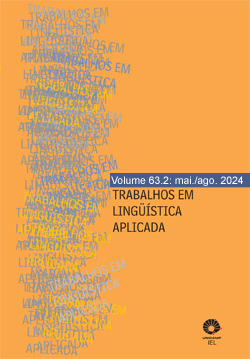Resumo
Nesta pesquisa narrativa, narro e componho sentidos de uma experiência como professora de inglês durante um curso que integrou premissas de gamificação e jogos digitais para promover o engajamento e a participação central dos alunos. Começo explicando o contexto em que a pesquisa foi realizada e apresentando os motivos da minha pesquisa. Em seguida, analiso a tarefa proposta, na qual os alunos responderam a um questionário sobre as características que, se tivessem a chance, gostariam de manter ou mudar em mim como sua professora de inglês. Suas respostas basearam a escrita de um poema, que mostrou a necessidade de eu sair do centro das atenções. A experiência seguinte narrada foi a de fazer com que meus alunos gamificassem sua prova oral final enquanto eu tentava guiá-los. Aprendi que o protagonismo deles conduziu ao engajamento e a uma atitude positiva em relação ao processo de aprendizagem. Também compreendi que meu desejo de estar ao lado e não em uma posição central não era suficiente. Ter vivido a experiência junto com eles foi o que me despertou para rever continuamente minha identidade profissional.
Referências
BENGEZEN, V. C. As histórias de autoria que vivemos nas aulas de inglês do sexto ano na escola pública. 2017. 208 f. Tese (Doutorado em Estudos Linguísticos) - Universidade Federal de Uberlândia, Uberlândia, 2017.
BROUGÈRE, G. (1998) Jogo e educação. Tradução de Patrícia Chittoni Ramos. Porto Alegre: Artes Médicas.
BUTLER-KISBER, L. (2002) Artful portrayals in qualitative inquiry: the road to found poetry and beyond. The Alberta Journal of Educational Research, v. 48, p. 229-239.
CAILLOIS, R. (1967) Los juegos y los hombres: la máscara y el vértigo. Tradução de Jorge Ferreira. México: Fondo de Cultura Económica, 1986. Título original: Les jeux et les hommes: la masque et le vertige. Paris: Éditions Gallimarde.
CLANDININ, J. D. (Ed.). (2007) Handbook of narrative inquiry: mapping a methodology. Thousand Oaks; London; New Delhi: Sage;University of Alberta.
CLANDININ, D. J. (2013) Engaging in narrative inquiry. New York: Routledge.
CLANDININ, D. J. (2020) Journeys in narrative inquiry: the selected works of D. Jean Clandinin. Oxon; New York: Routledge.
CLANDININ, D. J.; CAINE, V.; ESTEFAN, A.; HUBER, J.; MURPHY, M. S.; STEEVES, P. (2015) Place of practice: learning to think narratively. Narrative works: issues, investigations, & interventions, v. 5, n. 1, p. 22-39.
CLANDININ, D. J.; CONNELLY, F. M. (1995) Teachers’ professional knowledge landscapes. Advances in Contemporary Educational Thought, v. 15. New York;London: Teachers’ College Press.
CLANDININ, D. J.; CONNELY, M. (2000) Narrative Inquiry. Complementary methods for research in education. 1st edition. Washington: American Educational Research Associates.
CLANDININ, D. J.; CONNELY, M. (2015) Pesquisa Narrativa: experiência e história em pesquisa qualitativa. 2 ed. rev. Tradução: GPNEP: Grupo de pesquisa narrativa e educação de professores. ILEEL (UFU). Uberlândia: EDUFU.
CONNELLY, F. M.; CLANDININ, D. J. (1988) Teachers as curriculum planners: narratives of experience. USA; Canada: Teachers’ College Press; The Ontario Institute for Studies in Education.
CONNELLY, F. M.; CLANDININ, D. J. (Ed.) (1999) Shaping a professional identity: stories of educational practice. New York; London: Teachers’ College Press.
CONNELLY, F. M.; CLANDININ, D. J. Narrative Inquiry. (2006) In: GREEN, J.; CAMILLI, G.; ELMORE, P. (Ed.). Handbook of complementary methods in education research. 3 ed. Mahwah, NJ: Lawrence Erlbaum, p. 477-487.
DETERDING, S. et. al. (2012) From game design elements to gamefulness: defining “gamification”. Mindtrek.
DEWART, G.; KUBOTA, H.; BERENDONK, C.; CLANDININ, J.; CAINE, V. (2020) Lugone’s metaphor of ‘World-traveling’ in Narrative Inquiry. Qualitative Inquiry, v. 26, n. 3-4, p. 369-378.
DEWEY, J. (1938) Experience and Education. New York: Kappa Delta Pi.
ELY, M.; VINZ, R.; DOWNING, M.; ANZUL, M. (2001) On writing qualitative research: living by words. London; Philadelphia: Routledge Falmer, [1997].
HOLLINGSWORTH, S.; DYBDAHL, M. (2007) Talking to learn: the critical role of conversation in narrative inquiry. In: CLANDININ, J. D. (Ed.). Handbook of narrative inquiry: mapping a methodology. Thousand Oaks; London; New Delhi: Sage/University of Alberta, p. 146-176.
HUBER, J.; CLANDININ, D. J. (2005) Living in tension: negotiating a curriculum of lives on the professional knowledge landscape. In: BROPHY, J.; PINNEGAR, S. (Ed.). Learning from research on teaching: perspective, methodology and representation. Oxford: Elsevier Ltd., p. 313-336.
HUIZINGA, J. (1993) Homo Ludens: o jogo como elemento da cultura. 4 ed. Tradução de João Paulo Monteiro. São Paulo: Editora Perspectiva. (vom Ursprung der Kultur im Spiel, 1938).
KAPP, K. M. (2012) The gamification of learning and instruction: game-based methods and strategies for training and education. San Francisco: Pfeiffer.
LEE, J. J.; HAMMER, J. (2011) Gamification in education: what, how, why bother? Academic Exchange Quarterly, v. 15, n. 2.
LUGONES, M. (1987) Playfulness, “world-travelling”, and loving perception. Hypatia: a journal of feminist philosophy, v. 2, n, 2, p. 3-19.
MANZANO-LEÓN, A.; CAMACHO-LAZARRAGA, P.; GUERRERO, M. A.; GUERRERO-PUERTA, L.; AGUILAR-PARRA, J. M.; TRIGUEROS, R.; ALIAS, A. (2012) Between level up and game over: a systematic review of gamification in education. Sustainability, v. 13, n. 2247. Available at: https://doi.org/10.3390/su13042247. Access on: April 21st 2024.
MELLO, D. M. (2004) Histórias de subversão do currículo, conflitos e resistências: buscando espaço para formação de professores na aula de língua inglesa no curso de Letras. 225 f. Tese (Doutorado) – Pontifícia Universidade Católica de São Paulo, São Paulo.
PESCE, C. ESL Teachers ask: How can I gamify my ESL classroom? In: Busy Teacher. Available at: http://busyteacher.org/20574-gamify-esl-classroom.html. Access on: December 31st, 2019.
RICHARDSON, L. (2002) Writing: a method of inquiry. In: DENZIN, N. K.; LINCOLN, Y. S. Handbook of qualitative research. 2 ed. Thousand Oaks, CA: Sage, p. 923-948.
SAMAH, N. A. (2019) Who am I in my story of teaching? confronting my puzzle of practice through narrative inquiry. Nitel Sosyal Bilimler, v. 1, n. 1, p. 1-21.
ZEMBYLAS, M.; CHUBBUCK, S. (2018) Conceptualizing ‘teacher identity’: a political approach. In: SCHUTS, P. A.; HONG, J.; FRANCIS, D. C. Research on teacher identity: mapping challenges and innovations. Springer, Cham, p. 183-193.

Este trabalho está licenciado sob uma licença Creative Commons Attribution 4.0 International License.
Copyright (c) 2024 Valeska Virgínia Soares Souza


